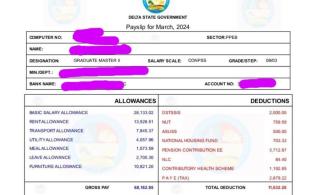
According to a March 2024 pay slip obtained by SaharaReporters, additionally, the government pays N7,845 for transportation and N4,057 for utility allowance, totalling N13,075 in monthly benefits.
A total sum of N1,073 has been found to be the monthly feeding allowance paid by the Delta State Government to teachers under the designation of ‘Graduate Master II’ in the state.
According to a March 2024 pay slip obtained by SaharaReporters, additionally, the government pays N7,845 for transportation and N4,057 for utility allowance, totalling N13,075 in monthly benefits.
A copy of the March 2024 pay slip seen by SaharaReporters showed that the government also paid N7,845 for transport and N4,057 for utility allowance.
Going by this payment arrangement, the government is expecting the teachers to spend N1,073 which is less than $1 to eat for a period of 30 days.
This is a key factor contributing to the ongoing demands by Nigerian workers for an increase in the national minimum wage, as they seek a fairer compensation package to cope with the country’s economic realities.
The Federal Government had proposed N62,000 as the new minimum which was rejected by the organised labour. But the governors in the country insisted that their governments could not afford to pay any amount above N60,000.
The Nigeria Labour Congress had also said it categorically rejected the attempt by some governors to arbitrarily determine the minimum wage for workers, stating that the approach would exacerbate poverty and insecurity in the country.
In a statement released last Friday, the NLC responded to recent comments made by governors seeking to pay workers whatever they deemed fit, emphasising that governors could not unilaterally dictate wages.
Benson Upah, Head of Information and Public Affairs, signed the statement, stressing that such an arbitrary approach was not only dictatorial but also undermined the principles and model established for fixing a national minimum wage in Nigeria.
Upah explained that the national minimum wage represents a baseline below which no worker should be paid, ensuring a minimum standard of living.
He argued that the governors’ demand to unilaterally determine the minimum wage threatens the welfare of Nigerian workers and the national economy, and urged adherence to collective agreements and established principles.

